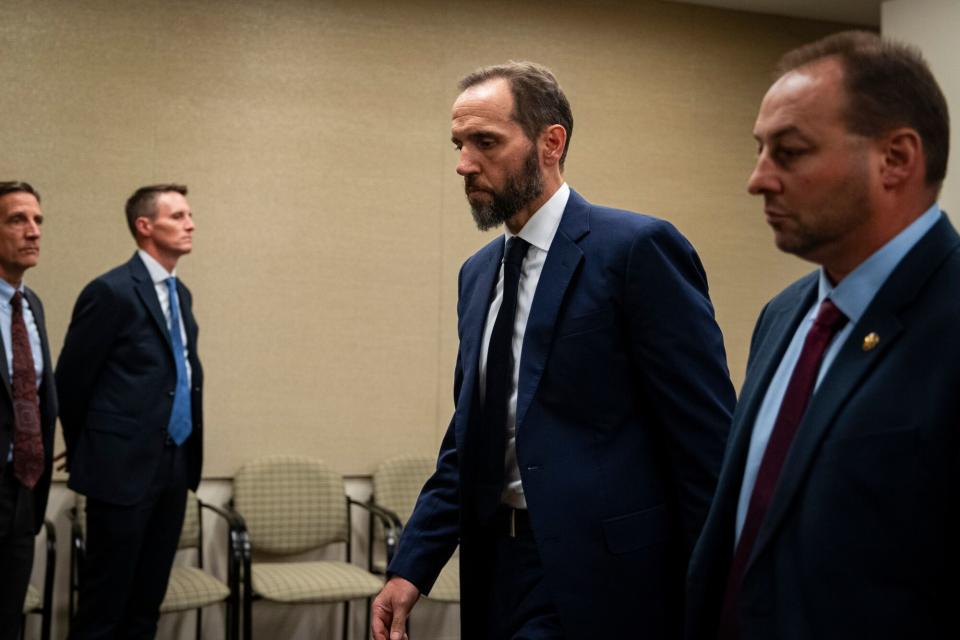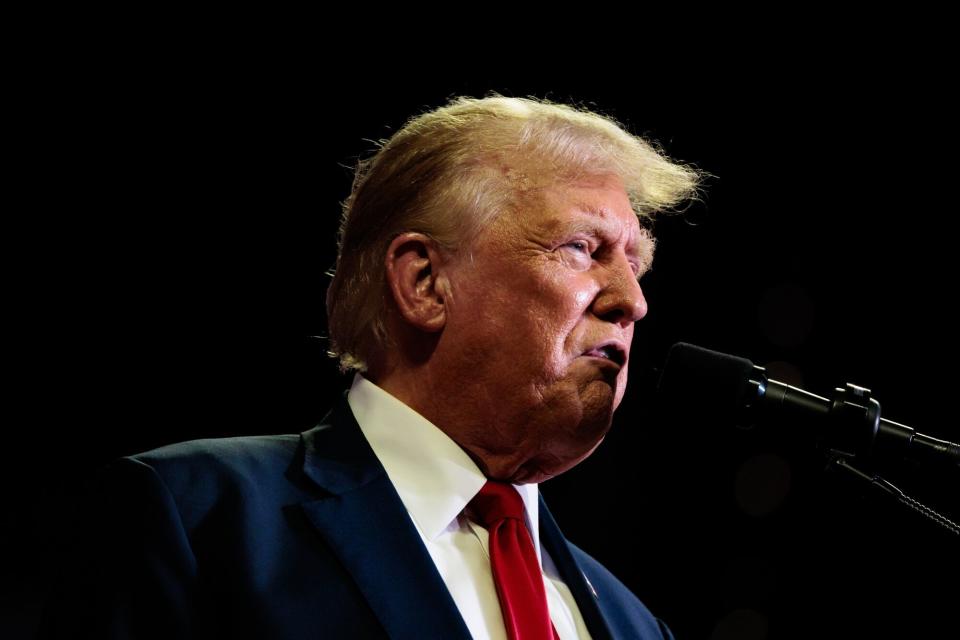Trump as President or Private Citizen: Why Supreme Court’s Immunity Ruling Is a Test
(Bloomberg) -- The US Supreme Court will rule Monday on Donald Trump’s claim that he’s immune from criminal charges over attempts to overturn the 2020 election, with a strong possibility the case will be kicked back to a lower court for more legal wrangling.
Most Read from Bloomberg
Democrats Weigh Mid-July Vote to Formally Tap Biden as Nominee
Trump Immunity Ruling Means Any Trial Before Election Unlikely
Beryl Becomes Earliest Ever Category 5 Hurricane in Atlantic
‘Upflation’ Is the Latest Retail Trend Driving Up Prices for US Consumers
Trump Isn't Going to Like the Supreme Court's Immunity Decision
The court’s view may boil down to this: Was he acting as president or as a private citizen?
Some of the nine justices indicated during oral arguments April 25 that in their view, former presidents can be prosecuted, but only over private conduct while in office. Several justices — including Chief Justice John Roberts — discussed asking the lower court to take a closer look at the allegations to distinguish what is part of a president’s job and what isn’t.
A mixed ruling would be a challenge for Special Counsel Jack Smith, potentially narrowing his historic case and preventing it from going to trial before Trump’s November rematch against President Joe Biden. And if he wins, Trump could order the Justice Department to drop the case.
But any ruling that keeps the case alive is a setback for Trump too, leaving the former president at risk of criminal charges that could result in years behind bars. It’s one of four criminal prosecutions against Trump as he campaigns, including a false-documents case in which he was found guilty on 34 felony counts on May 30. He’s due to be sentenced in that case July 11.
The Supreme Court justices indicated they may send the immunity fight back to US District Judge Tanya Chutkan, who is overseeing the case. Presidents already enjoy civil immunity for “all acts within the ‘outer perimeter”’ of official duties,” according to a 1982 Supreme Court ruling in an unrelated case. But the court hasn’t weighed whether a president is immune from criminal charges.
Read the Full Supreme Court Ruling on Trump Immunity
“The allegations in the pending indictment seem directed mostly at Trump’s conduct as a candidate, as opposed to his conduct as president,” said former federal prosecutor Barbara McQuade, adding that Smith could have an easy fix if any rulings went against the government. “Depending on where the court draws the line, Jack Smith would have the option of deleting from the indictment any conduct that might arguably be immune from prosecution.”
Smith and his prosecutors said decisions about which actions can be prosecuted should be worked out as the case is brought to trial — through rulings by the judge and jury instructions. Smith’s team said in a legal filing they should be able to reference official acts during trial, even if those acts can’t be prosecuted.
The justices, however, have already expressed skepticism toward Trump’s sweeping argument that the indictment should be dismissed because it relies heavily on his official actions following the 2020 election. Trump says he was trying to prevent what he alleged without evidence was a rigged election.
The key to determining what’s private versus official may come down to an earlier analysis of Trump’s conduct by an appeals court, in parallel civil litigation over the Jan. 6 riot. In those cases, the appeals court rejected Trump’s request for immunity from civil lawsuits over his conduct in office and he didn’t ask the Supreme Court to intervene.
The Supreme Court justices also revealed their thinking on private versus official acts in questioning Trump’s attorney during oral arguments.
‘Manner and Means’
The indictment didn’t break down Trump’s alleged conduct between the two categories. The document instead describes the “manner and means” in which Trump allegedly conspired to “obstruct and defeat” the federal government after he lost the election. Smith broke it down into five categories that all stem from Trump’s false claim that the election was rigged against him.
Pressured state legislators and election officials to disregard the popular vote
Organized fraudulent slates of electors in seven targeted states
Attempted to use the Justice Department to conduct sham election crime probes and push states to accept false electors
Attempted to enlist former Vice President Mike Pence to use his “ceremonial role” on Jan. 6 to fraudulently alter the election results
Exploited the assault on the Capitol by a mob of his supporters to delay certification
Justices’ Questions
Trump’s attorney, John Sauer, acknowledged during the April Supreme Court arguments that some alleged actions cited in Smith’s indictment sound like private business and could be prosecuted. Justice Amy Coney Barrett, one of three Trump appointees on the 6-3 conservative leaning court, grilled Sauer on a list of actions.
Barrett asked about turning to a private attorney willing to spread knowingly false election fraud claims or conspiring to enter a court filing containing false allegations? Private, Sauer agreed.
Directing an effort involving private actors and attorneys “to submit fraudulent slates of presidential electors to obstruct the certification proceeding,” she queried? Also private.
Sauer cited a list of actions described in the indictment that the Trump team believes represent official business, such as meeting with Justice Department officials, deciding who’s going to be the acting attorney general, communicating with the US public and communicating with Congress about matters of federal concern.
Civil Case Guidance
A set of separate civil lawsuits seeking to hold Trump liable for the Capitol attack were sent back to a judge in December to parse whether his actions — especially his participation in a Jan. 6 rally — were official and entitled to immunity. That process is expected to stretch into the fall. But an appellate court provided some guidance that might shed light in addressing the question of criminal immunity.
“If it is clothed in the trappings of an official function based on objective indicia, it more likely constitutes an official act for immunity purposes than if it bears the hallmarks of reelection campaign activity,” a US Court of Appeals for the DC Circuit panel wrote.
In the civil case, Trump’s lawyers were given several months to gather evidence on whether government resources were used to fund or organize the rally. In the criminal case, Chutkan would likely request briefings from Trump and Smith and hold hearings to determine the private versus official breakdown of actions in the indictment.
The process could be messy and contested, said David Weinstein, a former federal prosecutor. The timing depends on whether Trump’s team can immediately appeal decisions and whether judge or jurors make the determinations.
“I think they will look at the counts in the indictment,” said Weinstein, now a partner at Jones Walker LLP. “The burden is going to be on the defense to show that Trump was doing this in the course of his official duties. Then the question becomes what burden of proof are they going to require.”
--With assistance from Zoe Tillman.
(Updates with detail on Trump’s other criminal cases, upcoming sentencing.)
Most Read from Bloomberg Businessweek
The Fried Chicken Sandwich Wars Are More Cutthroat Than Ever Before
Japan’s Tiny Kei-Trucks Have a Cult Following in the US, and Some States Are Pushing Back
RTO Mandates Are Killing the Euphoric Work-Life Balance Some Moms Found
The FBI’s Star Cooperator May Have Been Running New Scams All Along
©2024 Bloomberg L.P.





